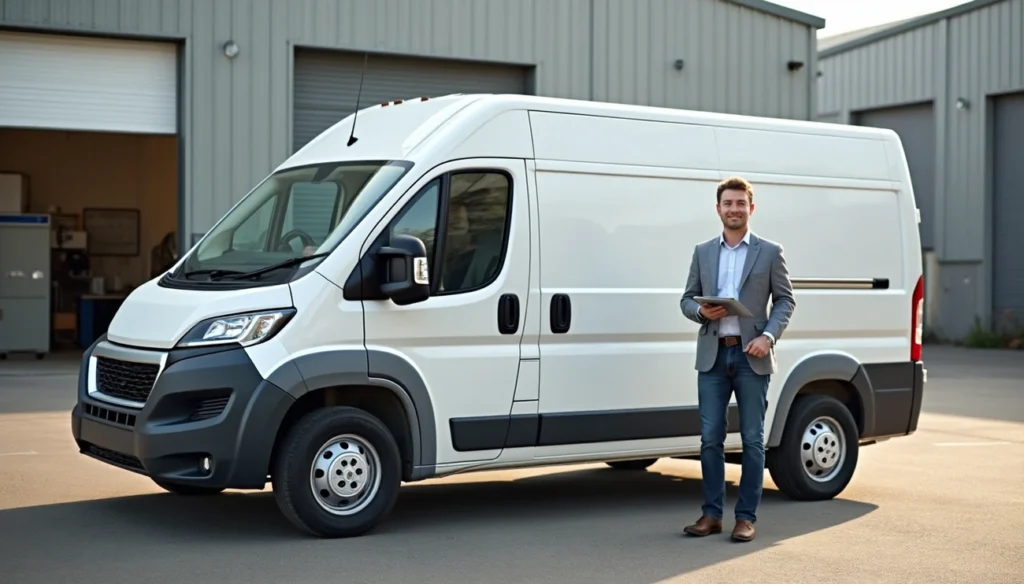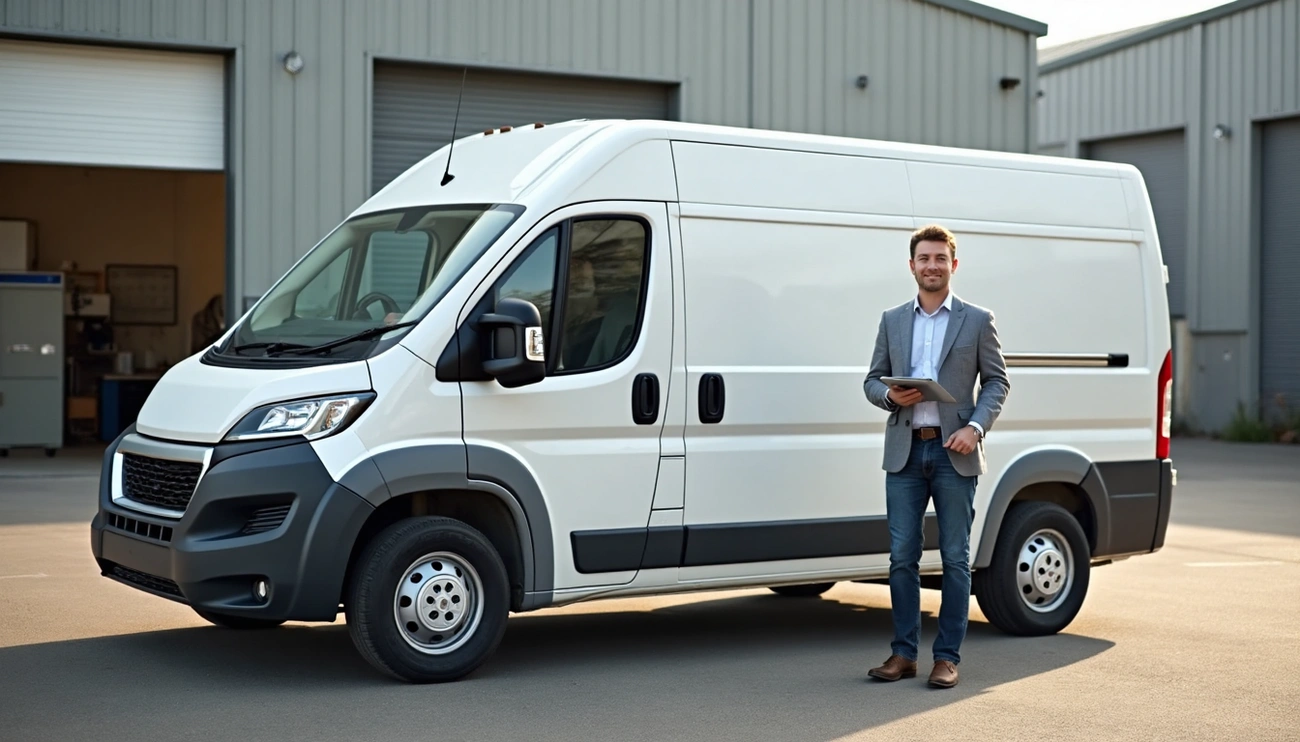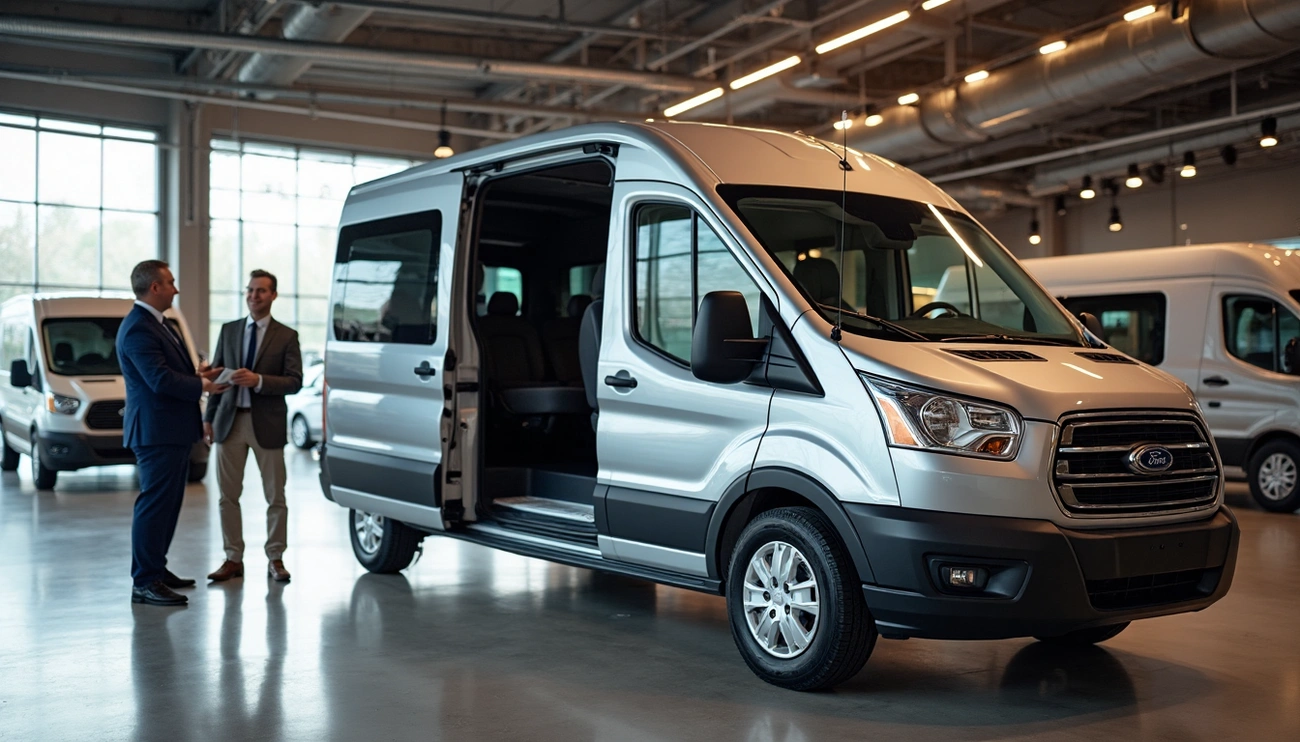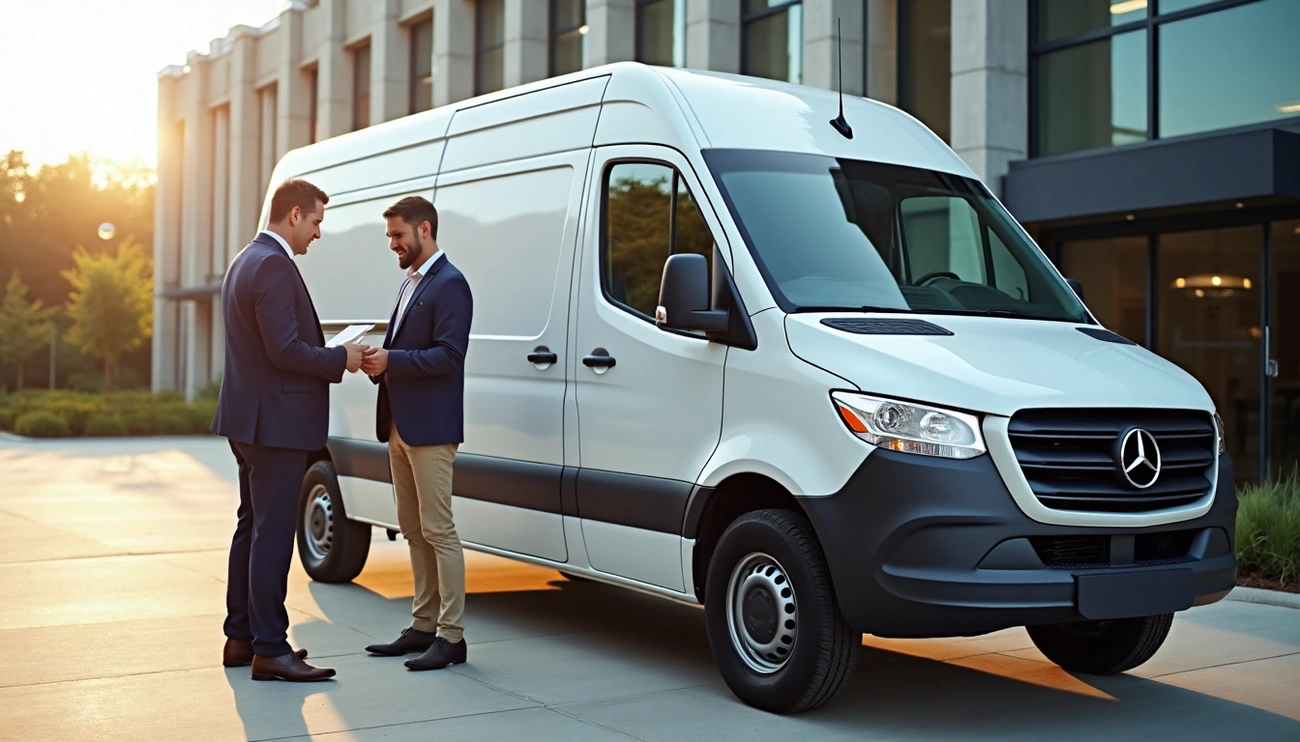Self-Employed Van Finance
Picture this: over four million self-employed workers call the UK home as of March 2022. That’s a massive community of go-getters who’ve chosen to build their own path. Van finance has become essential for this thriving workforce. Source
Here’s a striking fact—construction professionals spend up to 2.5 years of their working life behind the wheel. Your van isn’t just transport; it’s your mobile office, your workshop, your business lifeline. Getting the right vehicle matters more than you might think. See business van finance
Sure, securing van finance as a self-employed professional comes with its own set of hurdles. But here’s the good news: specific finance options exist just for sole traders and self-employed professionals like you. See business van leasing
Leasing is taking off among small business owners who want to drive brand new vans without the hefty upfront costs. Plus, many van-related expenses qualify as business deductions, reducing your tax bill.
Whether you’re running a limited company or operating as a sole trader, this guide breaks down everything you need to know. We’ll show you the requirements, boost your approval chances, and help you pick the perfect financing option for your business goals. See van finance lease
Ready to get your business rolling?
Can You Get Van Finance if You’re Self-Employed?
Absolutely. Self-employed individuals can secure van finance just like traditional employees. Lenders recognize that work vehicles are essential for business operations, so they’ve developed specific pathways for self-employed professionals to access the funding they need. See van finance companies
Who qualifies as self employed van finance
Lenders classify you as self-employed if you work for yourself rather than a company. This covers various working arrangements:
- Sole traders
- Freelancers
- Contractors
- Small business owners who manage their own operations
The UK hosts over four million registered self-employed workers as of March 2022. This substantial workforce relies heavily on vans to conduct business activities effectively. See electric van finance
Lenders expect you to meet basic criteria when applying. Most require at least 12 months of trading history, while others want a minimum of 24 months. You must also be officially registered as a business with an allocated company number. See Ford Van Leasing
Common misconceptions about eligibility
Let’s clear up some persistent myths about self-employed van finance:
“Self-employed people can’t get van finance at all” – Wrong. While the process involves more paperwork than for regular employees, van finance is readily available to self-employed professionals.
“Perfect credit is mandatory” – Not true. Many lenders specialize in helping self-employed individuals without perfect credit histories. Even with bad credit, specialized lenders can consider your application based on current financial behavior rather than past mistakes.
“Irregular income automatically disqualifies you” – Lenders understand that self-employed income fluctuates. They examine your overall financial health rather than expecting perfectly consistent monthly earnings.
“New businesses can’t qualify” – Most lenders prefer 1-2 years of trading history, but some specialized providers assist those with shorter business histories.

Differences for sole traders and limited companies
Your business structure affects how you apply for van finance:
Sole Traders:
- Apply for van finance as a private individual rather than as a company
- Need to provide more personal financial information
- Can access various financing methods including leasing and hire purchase agreements
- Buy vans outright instead of leasing if that better suits business needs
Limited Companies:
- Face fewer paperwork challenges during application because their financial information follows a standardized format
- Need less personal financial information in applications
- May access special deals with unique terms created specifically for limited companies
- Process is generally more straightforward than for sole traders
When applying for van finance as a self-employed person, you’ll typically need to provide:
- Proof of income (bank statements)
- Latest tax return
- Earnings form from HMRC
- Proof of address
- Details about your work history
Most lenders don’t accept cash payments as proof of income – earnings must go through a UK bank account in your name. Many finance providers won’t accept tax returns alone as sufficient proof of income.
Getting van finance as a self-employed person follows a process similar to applying for a bank loan, with lenders primarily concerned about your ability to make monthly payments.
What You Need to Apply for Van Finance
Getting your paperwork sorted makes all the difference. Lenders want to see you’re financially stable before saying yes to your application. Here’s exactly what you’ll need to gather when applying for self-employed van finance.
Proof of income and tax returns
Lenders care about one thing: can you make those monthly payments? Show them you can with these documents:
- Recent bank statements (last three months) showing steady income
- Your latest tax return proving declared earnings
- SA302 form from HMRC confirming your earnings
- Proof of address showing UK residency (often need five years minimum)
- Employment history from the past three years
Here’s what catches people out: cash payments don’t count as valid income proof. All earnings must flow through a UK bank account in your name. Tax returns alone won’t cut it for some lenders either. Got a business partner? Their income from a joint account might count, but they’ll need to join the application.
Business registration and trading history
Your business structure shapes your entire application. Lenders typically want:
Official business registration with an allocated company number—no exceptions. Most lenders expect at least two years of trading history, though specialists like AMT work with newer businesses.
Switching from sole trader to limited company? The process often runs smoother because you already have payment proof. Finance companies might ask for extra documentation like trading proof, bank statements, or a Director’s Guarantee. See Ford Van Leasing
Many lenders expect your net profit to be roughly double what you want to borrow. Makes sense—they want to know you can comfortably cover repayments. You’ll also need to declare whether the van serves business purposes, personal use, or both.
Credit check and financial background
Every van finance application gets a credit assessment. Lenders examine:
Your credit score based on debt amounts, payment history, credit length, new credit lines, and credit types. Late payments, defaults, or CCJs make you look risky.
Check your credit score online before applying. Being on the electoral roll proves your address and boosts your score. Keep credit usage below 50% of your limit—it shows responsible management.
Some lenders do a “soft search” initially, which won’t affect your score. “Hard searches” typically happen when you’ve found your van and contracts are ready. Don’t believe “no credit check van finance” claims—all legitimate lenders verify creditworthiness.
Been through bankruptcy? Most lenders want six years since discharge. CCJs or IVAs make approval tougher, but specialist lenders focus on helping people with imperfect credit histories.
Boosting Your Approval Chances
Getting approved for self-employed van finance doesn’t have to be a mystery. Smart preparation and solid financial habits can make all the difference—even if your credit history isn’t perfect.
Build a stronger credit score
A credit rating of 661 or higher opens doors to competitive van finance rates. Start by checking your current score through Experian, Equifax, or TransUnion. These checks won’t hurt your rating, so there’s no risk in looking.
Simple steps that pack a punch:
Get on the electoral roll – This immediately boosts your score and helps lenders verify your identity. Open a basic bank account with overdraft facilities to show you can handle credit responsibly. Start small if you’re new to self-employment—smartphone contracts or store cards help build your credit profile.
Clear existing debts
Your current financial commitments heavily influence lenders’ decisions. Paying down loans and credit card balances improves your debt-to-income ratio before you apply.
Here’s something many people don’t know: credit card cash withdrawals signal poor money management to finance providers—even when you repay quickly. Skip these transactions to keep your credit profile clean. A Debt Management Plan shows on your report but carries less negative weight than missed payments.
Break problematic financial links
Financial connections with people who have poor credit can damage your application—regardless of your own excellent record. Joint accounts, mortgages, or loans create these links. Someone else’s bad credit might hurt your chances.
You can sever these ties by requesting a “notice of disassociation” from credit reference agencies. Follow the three-month rule: make just one credit application within three months to protect your profile.
Get your paperwork sorted
Having all documents ready shows lenders you’re serious and organized. You’ll need proof of identity, address, income, and business information.
Create a dedicated folder for recent, valid documents—this prevents losing critical paperwork. Being prepared speeds up the application process and prevents delays that could hurt your chances.
Keep more than 50% of your credit limits available to demonstrate healthy financial management. This balanced approach shows lenders you don’t rely too heavily on credit, strengthening your application.
Your Finance Options Explained
Time to explore what’s actually available to you. Each finance option suits different business situations, so let’s break down what works best for your specific needs.
Hire Purchase vs Contract Hire
Hire Purchase (HP) means you’ll own the van eventually. Pay an initial deposit, then fixed monthly payments over 2-5 years, and the van becomes yours.
Contract Hire works differently—think of it as a long-term rental where you return the van when the contract ends. The key difference? HP requires VAT upfront, while Contract Hire spreads VAT costs over the term. Contract Hire often includes maintenance packages, making your monthly budgeting simpler.
Leasing vs buying outright
Leasing helps preserve your working capital while offering tax benefits. VAT-registered businesses using vans exclusively for work can reclaim 100% of VAT on lease payments. Plus, lease payments count as tax-deductible expenses.
Buying outright lets you claim capital allowances through the Annual Investment Allowance—potentially deducting 100% of the van’s cost against taxable profits in your purchase year.
Van finance for new businesses
New businesses aren’t locked out of van finance. Most lenders want:
- Official business registration with allocated company number
- Trading history of at least 12 months (sometimes 24)
- Evidence that your net profit roughly doubles what you want to borrow
Some specialist lenders work with businesses in their first two years of trading, though terms might be adjusted.
What about “guaranteed” van finance?
Here’s the truth: “guaranteed” van finance doesn’t exist. Every application gets assessed.
Poor credit? Specialized lenders can still consider your application based on current financial behavior. You might need extra documentation, a larger deposit, or accept slightly higher rates. The process resembles personal van finance but requires different paperwork.
Choosing the Right Van for Your Business
Your van choice shapes everything—from daily operations to your bottom line. Getting this decision right means finding a vehicle that works hard for your business without breaking the bank.
What does your business actually need?
Think about your daily routine. Are you hauling heavy equipment, delivering delicate goods, or providing mobile services? Each business type demands different van capabilities.
Urban deliveries call for nimble, compact vehicles that squeeze through tight streets. Long-distance hauling needs robust engines and comfortable cabs. Mobile service businesses require organized storage and easy equipment access.
Smart business owners plan ahead. Consider where your business might be in three years. That extra payload capacity or additional seating might become essential as you grow.
Small, medium, or large vans
Small vans like the Vauxhall Combo pack surprising utility into compact frames—load lengths up to 2.2 meters in overall lengths of 4.4 meters. Perfect for catering businesses, courier services, or trades working in city centers.
Medium vans hit the sweet spot for many businesses. Standard models offer load lengths around 2.6 meters. The Ford Transit Custom dominates this space—actually the UK’s best-selling vehicle of any kind.
Large vans max out at 3.5 tons (the limit for standard driving licenses) and stretch from five to nearly seven meters long. They need practice to handle safely but deliver serious payload capacity for growing businesses.
Electric vs diesel: the new choice
Diesel still rules the roads—86.5% of van registrations compared to electric’s 7.6%. But electric vans offer compelling advantages, especially for city-based businesses.
Electric operating costs can be half those of diesel on a pence-per-mile basis. With typical ranges around 100 miles, they’re ideal for urban operations. Bonus: no London Congestion Charge, ULEZ fees, or vehicle excise duty.
Diesel vans still win for heavy hauling. The Renault Master diesel carries over 1,500kg while its electric version manages 1,100kg. For long-distance work where charging infrastructure remains patchy, diesel provides reliability.
Limited company vs sole trader financing
Your business structure affects your van options significantly. Sole traders can reclaim VAT and reduce corporation tax through capital allowance claims when buying through their business name.
Limited companies enjoy streamlined applications thanks to standardized financial reporting. They also access specialized deals designed specifically for limited company structures—often with better terms than sole trader options.
Your Van Finance Journey Starts Here
Getting van finance as a self-employed professional comes with its challenges, but it’s absolutely doable with the right approach. We’ve covered how lenders have built specific pathways for the UK’s four million self-employed workers to access the funding they need.
Your business structure shapes your application journey. Sole traders need more personal financial details, while limited companies enjoy streamlined processes and potential specialized deals. Know your structure, know your path.
Documentation is your foundation. Bank statements, tax returns, and business registration work together to show lenders you’re reliable. Keep your credit score healthy through smart financial habits—it makes all the difference.
Your finance options fit different business needs perfectly. Hire purchase means eventual ownership, contract hire offers flexibility, and leasing preserves your working capital with tax benefits. Pick what works for your situation and growth plans.
The right van drives your success. Small vans work brilliantly in cities, medium vans offer versatility, and large vans maximize capacity. Electric options cut costs and avoid charges, though diesel still leads for long-distance work.
Van finance might feel overwhelming at first. But with solid preparation, proper documentation, and clear understanding of your business needs, you’re set for success.
Got your paperwork ready? Know your business structure? Time to secure that perfect van for your business.
FAQs
Q1. Can self-employed individuals qualify for van finance? Yes, self-employed individuals can qualify for van finance. The application process is similar to applying for a bank loan, with lenders primarily assessing your ability to make monthly payments. You’ll need to provide proof of income, tax returns, and business registration documents.
Q2. What are the advantages of leasing a van for self-employed professionals? Leasing a van can be beneficial for self-employed individuals as it offers fixed monthly costs for easier budgeting, access to newer van models, and potential tax benefits. For VAT-registered businesses using vans exclusively for work, you can reclaim 100% of VAT on lease payments.
Q3. How does self-employment status affect vehicle finance applications? Being self-employed can make vehicle finance applications slightly more challenging, as some lenders may view self-employed income as less consistent. However, many lenders offer specific pathways for self-employed professionals. You may need to provide additional documentation to prove your income stability.
Q4. Is financing a van a good option for business owners? Financing a van can be a good option for business owners, especially if paying the full amount upfront is too costly. It allows you to spread the cost over time, preserve working capital, and potentially benefit from tax advantages depending on your business structure and the finance option chosen.
Q5. What’s the difference between van finance for sole traders and limited companies? For sole traders, van finance applications require more personal financial information and are processed as individual applications. Limited companies face fewer paperwork challenges due to standardized financial reporting and may access specialized deals. Limited company applications are generally more straightforward than those for sole traders.




